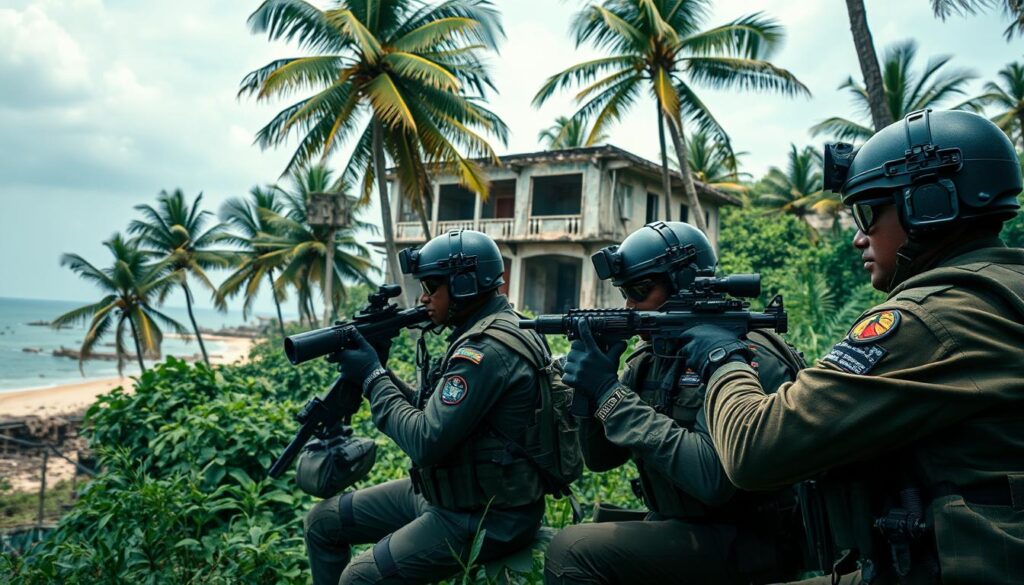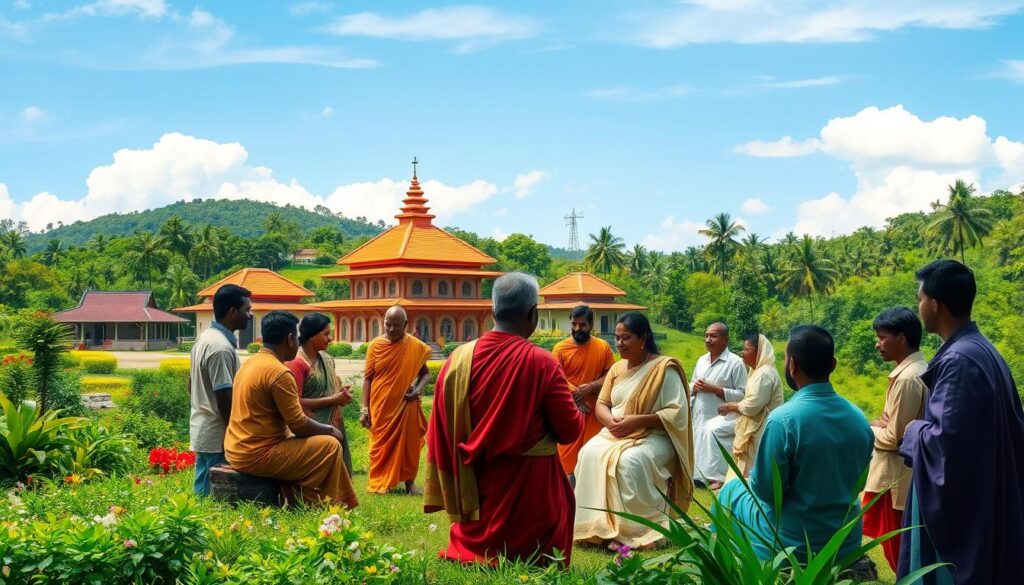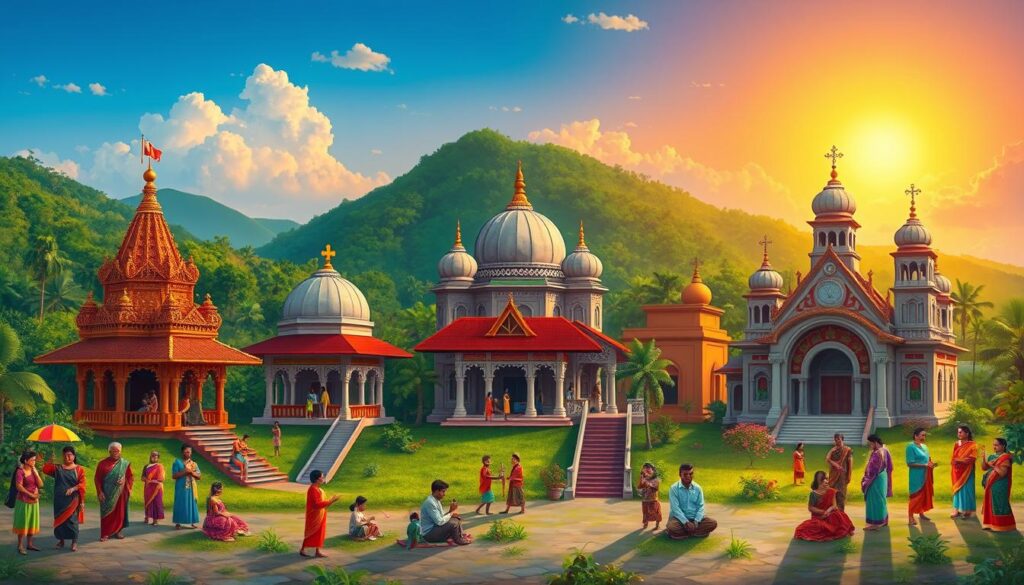Religious Minorities Face Shrinking Space in Sri Lanka
Sri Lanka is facing a tough time with its religious minorities. The country is known for its varied religious community. Yet, the freedom for these minorities is getting narrower. This is due to rising incidents of religious discrimination in Sri Lanka. Social exclusion and official actions add to this problem, showing the tension in this South Asian island.
Human rights groups have pointed out issues like the controversial Prevention of Terrorism Act (PTA). This act is often used against minority groups. Land disputes in areas affected by past wars increase Sri Lankan religious tensions. The building of Buddhist temples on lands important to Hindu and Muslim minorities causes more strain. Christians in rural areas also face difficulties. This all shows the shrinking space for religious minorities in Sri Lanka.
There is a need for unity, as seen in the recent Vesak celebrations. However, hardships like Judge T. Saravanaraja’s resignation due to threats highlight the tough road for religious coexistence in Sri Lanka. Government actions favoring Buddhist sites over minority worship places show the ongoing struggle.

Key Takeaways
- Escalating acts of religious discrimination in Sri Lanka adversely affect minority faiths.
- Legislation like the Prevention of Terrorism Act is often applied in a manner that impacts the minority rights and freedoms.
- Land disputes and the erection of Buddhist structures on minority lands fuel Sri Lankan religious tensions.
- The significant presence of Hindus, Muslims, and Christians in the north and east counters the Buddhist-majority narrative.
- President Wickremesinghe’s declarations and the militarization of cultural sites highlight the shrinking space for religious minorities in Sri Lanka.
- Judicial resignations and forced registration of new religious centers indicate a challenging environment for free religious expression.
Historical Context and Current Challenges for Minority Faiths
Sri Lanka’s mix of cultures and faiths is deeply historical but challenging for minority religions. Its religious diversity is key to the nation’s identity. Yet, it leads to friction, especially between the Sinhalese Buddhist majority and minorities like Hindus, Muslims, and Christians. These tensions often turn into discrimination and clashes over temple lands.
Understanding Sri Lanka’s Ethnic and Religious Composition
About 70% of Sri Lankans are Buddhists. The rest are Hindus, Muslims, and Christians. This blend of cultures and religions, while rich, sometimes leads to tension and conflict. The civil war and its aftermath saw many such periods, including attacks on religious minorities and disappearances of Tamils.
Growing Concerns Over Discriminatory Legislation and Practices
Recently, Sri Lanka has seen more laws that unfairly target religious minorities. These laws have restricted burial rights during the COVID-19 pandemic for Muslims and Christians. They also include a ban on face-covering veils. The Prevention of Terrorism Act (PTA) has been used to target these minorities, affecting their freedom and creating a culture of fear.
USCIRF and International Observers Raise Alarm
The USCIRF report and other international reviews have highlighted increasing religious persecution in Sri Lanka. They stress the need to protect minority faiths from national policies that sideline them. There’s a global call for Sri Lanka to ensure its diverse faiths can coexist peacefully and equally.
| Year | Event | Impact on Religious Minorities |
|---|---|---|
| 2019 | Easter Bombings & Subsequent Emergency Laws | Arrests of approximately 1,800 Muslims, highlighting exacerbated ethnic tensions and surveillance. |
| 2020 | COVID-19 Burial Regulations | Ban on burials affecting Muslim and Christian funerary practices. |
| 2021 | Veil Ban & Amendments in Anti-Terrorism Legislation | Increased targeting of Muslim populations and potential misuse of PTA to quash dissent. |
| 2021 | Outlawing of Organizations on Extremism Grounds | Political marginalization of groups under the pretext of clamping down on extremism. |
Shrinking Space for Religious Minorities in Sri Lanka
Recent events have shown a big decrease in civic space in Sri Lanka. This has really affected minority religious groups under pressure. People are talking more and more about how hard it is for these groups to practice their religions freely.
A clear example is the use of the Prevention of Terrorism Act (PTA). It’s unfairly used against Muslims, often on weak evidence. The government also wants to ban burqas and shut down Islamic schools. This shows a clear attack on religious freedom in Sri Lanka. A 2023 U.S. Department of State report talks about how bad things have gotten for religious minorities. It says we need to keep a close eye and help out.
There’s also more hate from nationalist groups towards Muslims. They see Muslims as a threat. Even though attacks on Christians went down from 80 in 2022 to 43 in 2023, the problem hasn’t gone away. Police not doing their job adds to the problem.
The country backing out of a U.N. agreement and some dictatorship-like moves have made people worry more about human rights suffering. This has got international groups asking for action. The USCIRF wants Sri Lanka watched more closely. They’re calling for the world to pay more attention and work together to solve these issues.
Keeping religious freedom alive needs strong interfaith talks in Sri Lanka. The CSW says to listen to U.N. suggestions and put pressure for legal changes. They even suggest using the U.S. Global Magnitsky Act against those hurting human rights. This shows how serious this is, reaching beyond just Sri Lanka.
Efforts in other areas, like sustainable fisheries, contrast sharply with the struggles of minority religious groups. It reminds us that tackling challenges in Sri Lanka needs many approaches. We mustn’t forget to protect those at risk and work towards an open and fair society for all.
Strategies and Recommendations for Protecting Religious Freedom
In Sri Lanka, religious minorities face big challenges. It’s crucial to work on strategies that protect their freedom to believe. Laws are key, and there’s a real need to change them to make sure everyone has religious freedom. Especially, the Prevention of Terrorism Act (PTA) needs a close look. It’s been used unfairly against Tamil and Muslim folks, catching a lot of Tamil youth unfairly from 2018 to 2021.
Improving how different faiths get along is super important for a respectful society. The scores showing how active people are in their communities are pretty low. Plus, the government isn’t supporting UN Human Rights like before. We really need to get people caring more about celebrating all religions. This could help stop the bad stuff like spying and unfair treatment High Commissioner Michelle Bachelet talked about. We should also help people see themselves as Sri Lankans first, which could make religious labels less of a big deal.
It’s also smart to use international tools and rules, like the Global Magnitsky Act, to push for better treatment of people. Talking directly to other countries helps put pressure on those who aren’t treating people right. This kind of support, like what defenders like Ambika Satkunanathan got, is huge. Sri Lanka’s seen as partly free and sort of okay at respecting religious practices right now. But with some smart changes, especially in how social media is used, things could get a lot better. Working with groups like OMP Sri Lanka to share real, fair news is key to making sure everyone knows what’s happening. This is all part of the bigger fight for justice and treating everyone right, no matter what they believe.


